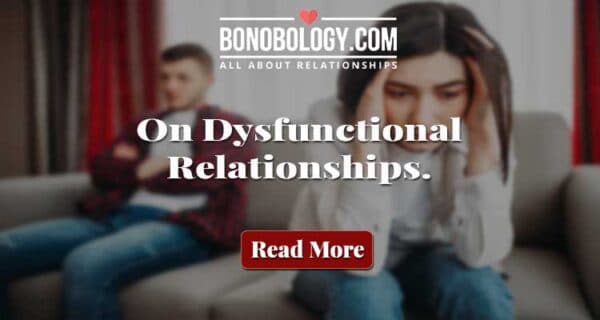The empath vs narcissist equation can be described as the opposite sides of a coin, two extremes of a spectrum of sensitivity. They fit like a puzzle, two halves of a broken piece, fulfilling each other’s needs. But, ironically, the whole of this narcissist and empath relationship is never a radiant blooming source of joy but broken shards of abuse and toxicity. A narcissist empath relationship exists because narcissism by definition is a lack of empathy. A narcissist is unable to relate to other people’s feelings while an empath goes as far as considering not just other people’s feelings but their problems as their own. A narcissist feeds off an empath like a parasite, and an empath allows it because it fulfills their pathological need to give. What results from this toxic relationship between an empath and narcissist is a one-sided transaction of sensitivity, care, consideration and love. To break the spell of this toxic attraction between empaths and narcissists, it is important to recognize their characteristics. Between the dichotomy of empath vs narcissist, if you identify as either of the two, it might be the first step toward healing your relationship or saving yourself.
What Is A Narcissist?
Do you know a self-absorbed megalomaniac who claims they are very sensitive, but their sensitivity is always directed toward their own emotions, completely impervious to the feelings of others? Do they always demand attention by seemingly harmless tactics of talking too much about themselves to indulging in aggressive attention-seeking behavior? Do they indulge in excessive self-praise, blatantly demanding admiration? Chances are the person who comes to your mind when you think of this description is a narcissist. The Diagnostic and Statistical Manual of Mental Disorders (DSM) describes narcissists as exhibiting a persistent pattern of “grandiosity, a lack of empathy for other people, and a need for admiration.” It lists other, more specific characteristics. For example, “a preoccupation with fantasies of unlimited success, power, brilliance, beauty, or ideal love”. Or “belief that one is special.” Or “exploitation of others”and “envy of others” amongst others. While a diagnosis by a mental health care practitioner is necessary to establish a Narcissistic Personality Disorder(NPD), some amount of self-education might help recognize toxicity in your empath vs narcissist relationship, allowing you to seek support.
What Is An Empath?
On the flip side, do you find yourself between the lines of this article because you feel tired from feeling too much, depleted from giving too much? Do you always find yourself in other people’s shoes, feeling what they are feeling – embarrassment, pain, guilt, loneliness, rejection? Do you tend to get too involved in other people’s problems trying to solve them like they were your own? Do you feel drawn towards being a caregiver, a listening ear? Do you feel the burden of care? Are you the “agony aunt” of your social circle? Have you been told you are too sensitive? Chances are you are an empath. An empath is a person who has empathy more than the average person. As per the Encyclopedia of Social Psychology, empathy is defined as understanding another person’s experience by imagining oneself in that other person’s situation. Empaths are highly receptive to the emotions of other people and energies around them. They tend to easily discern the vibe of their surroundings and can feel other people’s feelings as if they were their own. This might sound like a superpower but ends up causing empaths a lot of stress and exhaustion as they spend their lives taking on the pain of others in addition to their own pain. Recognizing these traits in yourself might help you in spotting this self-destructive tendency and seeking help to manage the burden you have taken upon yourself in your empath vs narcissist relationship.
Empath Vs Narcissist
Since it is evident that empath vs narcissist are two extremes of the spectrum of empathy, what narcissists lack, empaths have a lot to give making theirs an emotionally abusive relationship. Narcissists make themselves the center of attention, empaths like to give all their attention to someone. Narcissists demand to be taken care of, to be loved, to be cared for, empaths feel the need to care for someone, to lend a helping hand, to nurture. Narcissists believe everyone is envious of them, is out to get them or hurt them. Narcissists find their egos often bruised, while empaths have a subconscious compulsion to be the savior, to heal the wounded. These starkly complementary traits make the ill-fated toxic attraction between empaths and narcissists inevitable.
Why Do Empaths Attract Narcissists?
Empaths attract narcissists precisely because of these opposable and complementary traits. When narcissists are not arrogant, they look confident and assertive. To a vulnerable emotionally gentle empath in an empath narcissist relationship, that is an attractive quality. To the narcissist, the empath’s people-pleasing persona is conducive. Similarly, when a narcissist finds their ego bruised —which they often do—the subconscious instinct in the empath to be the savior takes hold of them and drives them to go out of their way to soothe the wounds of the narcissist. Empaths spend infinite time and energy listening to narcissists vent, giving them the attention they seek, showering them with words of sympathy and compliments. But an empath never tries to break free of this burden because they are more aware of the sense of fulfillment and purpose this transaction gives them than the tiredness they feel. Simply put, an empath attracts a narcissist because the capacity of an empath to love is immense and all that a narcissist needs is someone to worship them. The void of love and admiration in a narcissist is a magnet that immediately pulls an empath close into a neverending cycle of a toxic relationship.
Understanding The Relationship Between Narcissist And Empath
Early on in an empath vs narcissist relationship, the narcissist spends time enriching the relationship, subconsciously aware that in the long run, it will be of benefit to them. Since narcissists are assertive and outgoing, they may make grand gestures of love to solidify the relationship. An empath in a relationship with a narcissist is usually completely smitten, a worshiper. Once an empath is emotionally invested to this degree it is usually very difficult for them to show resistance, break up and get out of it. Empaths are well-meaning people with a sincere desire to love and heal others. They are driven by harmony and tend to avoid conflict at all costs. These qualities serve the purpose of the narcissists very effectively, who need someone to admire them and put them on a pedestal during good times while being an easy victim of emotional manipulation and taking the blame for all their pain during difficult times.
Unhealthy Toxic Empath-Narcissist Relationship
Quite literally like a moth to a flame, an empath is drawn to a narcissist only to find their own spirit go up in smoke. Destroyed. An empath and narcissist marriage is extremely conditional and therefore fragile. It might not turn into separation, or divorce, because both parties are quite literally addicted to each other, but it might cause a lot of pain and agony to the empath. Narcissists indulge in all sorts of abuse, physical coercion as well as as emotional manipulation to get their way. When an empath tries to break free, a narcissist may use gaslighting in the relationship to coax them into believing that they are being oversensitive, mean and selfish. Seeking help is almost impossible for a narcissist since they lack the self-awareness to recognize the scope for self-improvement, believing they are always right. So, the onus of addressing this dysfunction in an empath vs narcissist relationship also ends up on the shoulders of the empath. Here comes the importance of support groups and professional mental healthcare. If you are a victim of abuse from a narcissistic partner or if you recognize yourself as an empath unable to break free but would like to stand up for yourself, please seek therapy and find support in your community. Educating oneself, drawing clear boundaries and seeking professional help, are the primary steps to freeing oneself from the toxic relationship between a narcissist and an empath.



